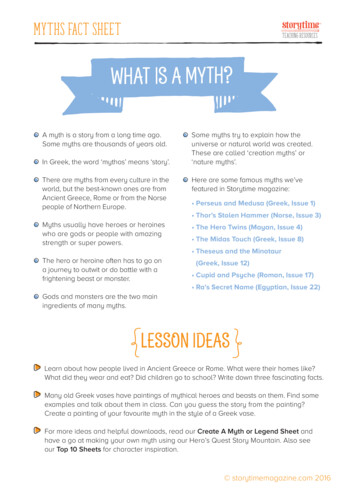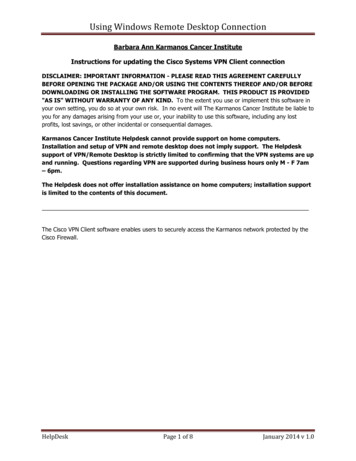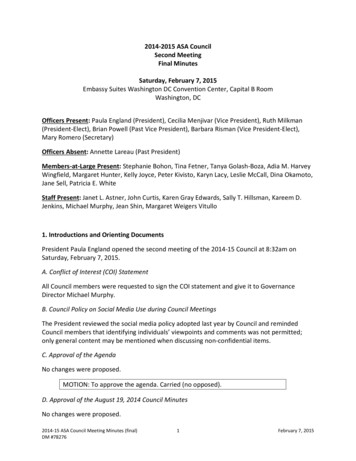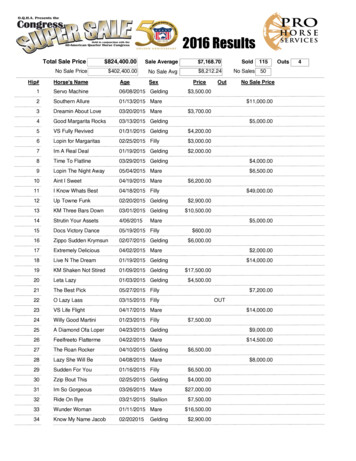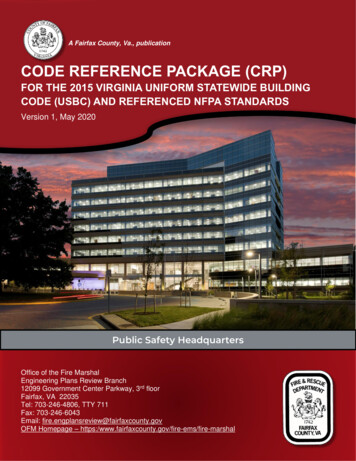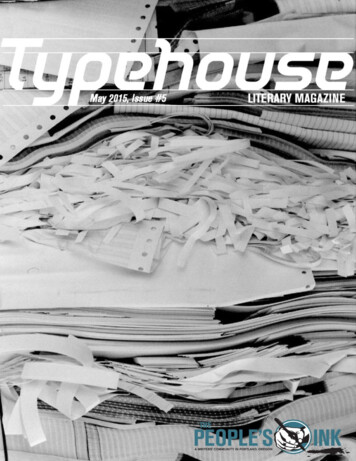
Transcription
1 Typehouse Literary Magazine
Issue #5, May 2015 2
Call for SubmissionsTypehouse is a writer-run, literary magazine based out of Portland, Oregon. We publishnon-fiction, genre fiction, literary fiction, poetry and visual art. We are always looking forwell-crafted, previously unpublished, writing that seeks to capture an awareness of thehuman predicament. If you are interested in submitting fiction, poetry, or visual art, emailyour submission as an attachment or within the body of the email along with a short bioto: typehouse@peoples-ink.comEditorsKai SoderbergVal GryphinCover PhotoLost Archive by Fabio SassiFabio Sassi started making visual artworks after varied experiences in music and writing. Hemakes photos and acrylics using tiny objects and what is considered to have no worth by themainstream. Often he puts a quirky twist to his subjects or employs an unusual perspective thatgives a new angle of view. Fabio lives and works in Bologna, Italy. His work can be viewed atfabiosassi's portfolioEstablished 2013Published Trienniallyhttp://typehousemagazine.com/3 Typehouse Literary Magazine
Table of Contents:Fiction:THREE VERY SHORT STORIES INVOLVING FOOD AND SOME VIOLENCE JudyFreni5Men at Work #129 Robert Laughlin21Return to Ordinary Michelle McGill-Vargas22Useless Things James Mulhern32Tabernacle David Braga51Mary Philip Rafferty63Drunk on the Isle of Misfits Dina Honour77The Effects of Burning Flesh Leon Marks83Creative Non-Fiction:Metanoia Alexandra Gilwit66Poetry:Max Mundan27Law Alsobrook50John McGinley76Visual Art:Fabio SassiCoverDavid J. Thompson59Kyle Hemmings94Issue #5, May 2015 4
Judy Freni has studied fiction writing at Gotham Writers Workshop and for a number of years withPushcart Prize-winning author Alex Mindt. She is a member of Mystery Writers of America andSisters in Crime and hopes someday actually to write (and of course publish!) a literary crimenovel. She lives and writes in New York City.THREE VERY SHORT STORIESINVOLVING FOOD AND SOME VIOLENCEJudy FreniI The LobsterPopeye was a cull. He had lived alone in one of the tanks at the Lobster Hut in Mattapoisett almosthis whole life. By the time Mary Ann came to work at the restaurant the summer between her juniorand senior year he weighed close to fifteen pounds and his lone claw was the size of a big man’sfist.“What is that thing?” she asked Mr. Pereira, her boss, the day she started work as a waitress. Shetapped on the glass with her fingernail and peered into the water. Bubbles from the filter gushed upthe back of the tank and percolated on the surface. The lobster scuttled toward her across thebottom on its eight thin little walking legs.“That,” said Mr. Pereira, “that is the biggest damn lobster you’re ever likely to see. His name’sPopeye.”The crustacean’s beady black eyes looked out at her. He flexed his claw.“Popeye?” Mary Ann said. “Why?”“Look at that claw,” Mr. Pereira said. “Doesn’t that remind you of Popeye’s arm?”5 Typehouse Literary Magazine
“Not really,” Mary Ann said.“ Come on, of course it does. That great big spinach-fed arm with the ham fist at the end of it?”“Well, maybe,” Mary Ann said.Popeye scraped his claw against the glass.“He’s saying hi,” Mr. Pereira said.“Oh, right,” said Mary Ann. “Like I believe that.”“Really,” said Mr. Pereira. “He is.”###The Lobster Hut was built on a wide pier overlooking the harbor. It had two dining rooms: oneinside with real tables and chairs and waiter service, the other out on a deck where people sat atpicnic tables and ordered their food from two take-out windows cut in the side of the building. Mostdays Mary Ann worked the four to midnight shift on the deck. Some days she worked the lunchrush instead and sometimes she did a double shift and worked lunch and dinner. Every two weeksMr. Pereira rotated the indoor and outdoor staff and Mary Ann switched with another waitress andworked the indoor dining room.The Lobster Hut served platters of fried clams, the real ones with big, bulging, creamy bellies. Lotsof tartar sauce to dip them in. Lobster rolls. Quahog fritters. Lobster bisque. And of course thewhole steamed lobsters that most people ate with plastic bibs tied around their necks so the drawnbutter wouldn’t drip down their shirt fronts. The vents from the kitchen blasted warm air filled withthe smell of seafood onto the deck. It mixed with the smell of French fries and cole slaw androasted corn at the tables. Salt water and seaweed smells from the harbor. Gulls screechedconstantly overhead and dived for scraps on the deck. The deck was a hard place to work, noisyand fast-paced and hot. Mary Ann was sweaty and uncomfortable out there but she still preferred itto the indoor dining room where the air conditioning made her shiver and there was no saltybreeze to blow back her hair.###Mary Ann had been working at the restaurant for about three days before she first noticed thatPopeye seemed to be looking at her every time she walked past him. When she crossed in front ofIssue #5, May 2015 6
his tank in the lobby on her way to the outdoor deck, he would come out from where he was hidingin the dark, bubbling water at the back and skitter along the glass front, following her movementsas she walked.She stopped and looked in at him. His little black eyes looked back at her. She walked along thetank and he came along with her on the other side of the glass. She turned and walked back to thedining room door, then looked over her shoulder. Popeye had also turned back, walked the lengthof the tank and was now looking at her from the short side.“I think that lobster knows me,” she said to Mr. Pereira as they were leaving the restaurant onenight.“I told you,” he said. “He likes you. He’s liked you since the first day you were here.”“That’s just crazy,” Mary Ann said.“Why?” Mr. Pereira asked.“Because,” Mary Ann said. “Because he’s he’s just a giant bug. How can he know me? That isreally creepy.”“He knows who he likes,” Mr. Pereira said.###The next day when no one was looking, Mary Ann put her hand in the deep tank, then slid herwhole arm in and down toward the bottom until the water almost touched the short sleeve hem ofher t-shirt. She swam her fingers around in the water and waited to see what would happen.Popeye came out from the back of the tank and walked toward her hand. He reached forward withhis feelers and touched her. She put her hand on his hard carapace and pressed him down to thefloor of the tank. He stayed there, not struggling to escape, waving his feelers in the water andopening and closing his claw. She ran her fingers along his back.“Pheromones,” Mr. Pereira said, coming in from the kitchen.“That’s disgusting,” said Mary Ann.“He’s in love with you.”7 Typehouse Literary Magazine
“No way,” she said. “Gross.”###She didn’t even realize she’d started singing to Popeye during her breaks. Nothing romantic. Justlittle upbeat tunes that came into her head as she walked by the tank. But Popeye seemed torespond, rotating his eyes and waving his feelers. She found herself paying anxious attention to thegroups of people waiting in line for a table in the dining room. He’s not for sale, she would tell themwhen she found them gathered around Popeye’s tank, overheard the excitement in their voices atthe idea of a lobster that size sitting steamed on a platter. The very thought of someone’s bratty kidholding up Popeye’s giant cooked claw in a Facebook selfie made tears well up in her eyes. Andshe hated it when she heard people making fun of him. She would stand with her fists on her hipsand stare them down. How would you like it if someone said that about you, she’d ask. Peoplelaughed and thought she was kidding. It was no joke to Mary Ann.###Families with young kids almost always ate on the deck overlooking the water. They’d put theirorders in at the window and wait for their numbers to be called. Sometimes, when the deck wasovercrowded or the weather wasn’t great for eating outdoors, they would sit in the indoor diningroom.Mary Ann did not like badly behaved kids in the dining room. It was bad enough when they wererunning around on the deck, chasing the sea gulls and knocking over ketchup and soda on thepicnic tables. At least the deck was outdoors. The dining room, though casual, was a notch aboveand she wanted kids in their seats, not getting under her feet when she was carrying overloadedtrays of food high above her head. And she really hated parents who ignored their children’s badbehavior, allowing them to put their feet up on the chairs or shred paper napkins onto the floor ordrop chowder crackers into their water glasses and stir up the mess with their straws.A boy and his father, both sunburned and wearing Red Sox caps low on their foreheads, came intothe dining room one night around seven. They were seated at a small table near the windows. Theykept their hats on. The boy, about eight years old, immediately began kicking the chair rail with hissneakers and ripping open sugar packets, tipping the contents into his mouth.“What can I get you guys?” Mary Ann stood in front of their table in her short white waitress’s skirtand white t-shirt with the lobster embroidered on the pocket.“Not sure,” the father said. “It’s our first time here. What’s good?”Issue #5, May 2015 8
“Everything,” Mary Ann said. “It’s all fresh. Just caught.”The father looked down at the menu.“The clams are strips or bellies?”“Bellies,” Mary Ann said. “We don’t do strips.”“I don’t like bellies,” the boy said. “I only like strips.”“Sorry,” Mary Ann said. “No strips.”“I’ll have the fried haddock platter,” the father said.” With fries and onion rings. And a Pepsi.” Henodded at his son. “What do you want?”“I want strips,” the boy said. He dumped a packet of sugar on the table, ran his finger through itand put it in his mouth.Mary Ann tapped the point of her pencil hard against her order pad.“Look,” his father said. “Why don’t you have a lobster. There’s a whole tank full of them out there inthe lobby. We can go pick one out.”The boy drummed his feet against the chair rail and sucked sugar off his finger.“A big one? Can I have a big one?”“Yeah, sure,” his father said. “Come on. Let’s go look.”Mary Ann followed them into the lobby.“I want that one,” the boy said running up to Popeye’s tank.Mr. Pereira was standing near the cashier, looking at receipts. He glanced up when he heard theboy, saw his face up against the glass of Popeye’s tank.“He’s not for sale.” Mary Ann said.9 Typehouse Literary Magazine
“I -WANT- HIM .” the boy said banging his fist against the glass.Popeye had retreated, far to the back of the tank, where he sat moving his feelers along thebottom.“Stop doing that,” Mr. Pereira said. He walked across the lobby and stood next to the tank. “ He’snot for sale. Pick one of these.” He pointed to the other tank, full of lobsters clambering over eachother. “There’s some good big ones in here. I’ll steam one of these.”“I want this great big monster one,” the boy said again. “Daddy, I want this one.”“They’re really tough when they’re this big,” Mary Ann said. Popeye had come cautiously forward,close to the glass front, looking out at her with his beady eyes. His antennae waved slowly in thewater and he opened and closed his huge claw.“Do you see a sign that says this lobster isn’t for sale?” the boy’s father said. His jaw jutted forwardunpleasantly. “I don’t see any sign. You sell lobsters. That’s a lobster. You can give us a doggy bagfor what he can’t eat.”A crowd of waiters and diners gathered in the doorway to the dining room, watching. Mary Ann andMr. Pereira stood silently in front of the tank.“Do I have to get him myself?” the boy’s father asked.“That would not be a good idea, sir,” Mr. Pereira said.“Not a good idea at all,” Mary Ann said. She backed against the tank and spread her arms out tocover the glass.“Get out of my way,” the boy’s father said, shoving Mary Ann aside.”I’m getting that damn lobster.”Mary Ann stumbled and banged her elbow hard against the counter where they kept menus andlobster souvenirs.In the tank Popeye stood up on his tail and scrabbled at the glass with his huge claw.“If you don’t calm down and step away from the tank I’m going to call the police,” Mr. Pereira said.“Like I give a shit,” the father said.Issue #5, May 2015 10
Mary Ann stood rubbing her elbow. She stepped forward. Mr. Pereira reached out and put his handon her wrist.“He’s not pegged,” one of the waiters called from the crowd by the door.“So?” said the father.“So,” said Mary Ann. “You’ll see.”“See what?” the father said.Mr. Pereira shrugged. Mary Ann shook her head. The father plunged his sunburned arm into thetank. Popeye scuttled to the back under the filter bubbles. The father’s fingers swam through thewater, opening and closing, trying to get a grip on the giant lobster.“Dad,” said the boy. “Daddy, I don’t want him anymore. He’s scaring me.”Someone in the crowd by the door called out go get him, mister. Someone else said he’s nuts withhis hand in there.“Oh,” the father said. “Aaaaarghhhhh!”The crowd moved forward. “Oh, shit,” someone said.“I told you,” said Mary Ann.The father’s hand and arm came surging up out of the tank in slow motion, breaching the surfacelike an Orca, the muscle in his bicep bulging from the weight of the fifteen pound Popeye nowattached to his index and middle fingers by his massive claw.“Get him off! Get him off!” the father screamed. Popeye and bloody pieces of two crushed fingersdropped to the floor. The father collapsed back against the wall, slid down to the floor howling intohis bleeding hand.“Daddy? I don’t want him for dinner. I really don’t,” the boy sobbed. “I’ll have clams, I promise.”Popeye lay in a puddle of salt water, his claw moving across the linoleum and his feelers testing theair around him. Mary Ann bent down and lifted his heavy body. He was cold and smelled of the11 Typehouse Literary Magazine
sea. Fifteen pounds of hard shell and claw nestled against her shoulder. Popeye tickled her neckwith his antennae. She hugged him close.II The Birthday CakeI promised that shit a Fudgy the Whale cake for his birthday and that’s what he got. That and a setof king-sized Harley sheets from Wal-Mart with red and orange flames printed on them. They werestiff like cardboard when I took them out of the package and smelled really poisonous fromwhatever chemicals they use in a sheet factory so I washed and dried them with rain-scented Tideand a lot of fabric softener. Then I put them on the bed with that fuzzy red blanket we have andeven put a red light in the ceiling fixture to make it sexy and all. Don’t know why I bothered since hestayed out drinking with his friends way past the nine o’clock he said he’d be home.\Once it got to be nine-thirty and he hadn’t shown up I called his cell to check and it went right tovoice mail so I said where the hell are you and hung up.I’d had the whale on the table for a while letting it thaw just a little so it would be easy to cut whenhe got home. I waited another fifteen minutes and when he didn’t call back I stuck the Carvel box inthe freezer and wandered around the house in the other part of his birthday surprise--my new seethrough shorty nightgown with the marabou around the neck and no panties--smoking like I wasn’tsupposed to because I quit last week, and saying nasty things out loud to the walls about that bigshit-face jerk.The big jerk is named Jimmy but all his friends plus me call him Ahab, like in the book about thewhale, joking because he has a fake leg. My Ahab’s fake leg is titanium. He lost the real one in amotorcycle accident, drunk driving in the rain on Route Twenty-five just outside Southold. He hit aslick spot. The bike went one way and Ahab went the other. He slid across the whole road, bothlanes, and slammed into some trees. Just about crushed his leg. Messed it up so bad there wasnothing they could do but take it off below the knee. The bike barely got a scratch--it’s been in thegarage since--but Ahab wound up in the hospital for a good while and then after that he spent thenext six months in rehab getting fitted for the leg and learning to walk again. It was his own damnfault and he’s lucky he didn’t lose a whole hell of a lot more than his leg.We’ve been living together for about two years, ever since I finished up my practical nursing courseand he got out of rehab. Rehab’s where we met. I was working there part time while I was going toIssue #5, May 2015 12
school. Doing stupid stuff like pushing wheelchairs and helping people get where they had to goonce they graduated to crutches but still weren’t too sure of their balance. Sometimes just forlaughs I like to tell people oh, yeah, we met in rehab, just to see what they’ll say. Like we were acouple of druggies. But they usually figure out what I mean because of his leg, not to mention thatI’m still working there but full-time now. I want to be a real nurse so I’m taking some courses thatwill help get me into a decent nursing school. Maybe work in a real hospital and not just a placelike the rehab.Ahab quit community college after the accident even though I told him it was a dumb thing to doand he’d never go anywhere without some advanced education. He has disability and wants to goto film school but I don’t think that’s ever going to happen.I’d like to get married, maybe have a kid or two, but he refuses. He says he has his reasons, one ofthem him not being the marrying kind whatever that means. Sometimes I wonder why I put up withhis shit. When I finish nursing school if he hasn’t motivated his ass up off the sofa where hespends most days, well, that will probably be it for me.So around four a.m. in he comes, stomping that damn leg up the back porch steps and cursing,probably because I shut the outside light off and he can’t see where the hell he’s going in the dark.Stump, thunk. Stump, thunk. That’s his real leg with the heavy work boot first and then his fake legwith the fake foot in the other boot. Stump, thunk. Ahab’s a big guy. He makes a lot of noise.“Carla!!!” he pounds on the back door.I fell asleep on the sofa around midnight, too pissed off to stay up waiting for him anymore, butsome asshole in an SUV with the radio blaring and the bass pounding right outside the housewoke me up about an hour ago. I’m doubly pissed because of that. I couldn’t get back to sleep soI’ve been killing time playing mindless games of solitaire on Ahab’s laptop at the kitchen table.“Shut up,” I say to myself out loud but not so loud he can hear me. “You’ll wake the neighbors. Useyour fucking key.”I hear his key against the lock but it’s not going into the hole. It just keeps scraping against themetal.“Carla,” he yells again. Some dogs start barking across the street.I get up from the table and open the door.“Jesus Christ,” I say. “Will you shut up for God’s sake.”13 Typehouse Literary Magazine
He comes inside and stares at me, points to my nightgown, which is all wrinkly now and stuck tomy bare ass from sitting on it while I played solitaire.“What the fuck is that?” He starts to laugh. “You look like a Vegas whore in that get-up.”I don’t say anything. I just stare back at him, pull my nightgown off my butt and fluff it out. Then I goacross to the refrigerator, open the freezer door and take out the Carvel box. I put in on the tableand take off the cover. A re-frozen Fudgy stares at me with his little red frosting eye. I reach into thebox and pick him up by the tail. He’s hard as a rock and all raspy with freezer burn. My fingers gonumb pretty fast.I walk back across the kitchen and stand in front of Ahab, give him a look that means business.“Carla,” he says with that tone in his voice I don’t like. It’s a warning tone and it just gets on my lastnerve.I swing my arm fast and hit Ahab in the face with the frozen whale, take out a good chunk of skinand flesh on his left cheekbone. It knocks him back a step or two. Blood starts to run. Fudgy’sbody breaks off from the tail and drops to the floor.“There’s your fucking whale,” I scream, shaking my fist and the frozen tail in the air. “Happy fuckingbirthday.” I drop the tail and it lands next to the body.“Jesus, Carla,” he says putting his hand up to his face.I stand in the middle of the floor, opening and closing my freezing hand, trying to catch my breath.“Jesus,” Ahab says again.“I’m sorry,” I say, all the fight and anger gone out of me. I go over to the sink and run warm wateron a towel, go to Ahab and press it against his bleeding cheek. He winces. “I’m really sorry. I’ll getyou a band-aid.”I go in the bathroom and rummage around in the medicine cabinet but no luck. We’re out. Geez,you’d think a nurse wannabe like me would be more prepared but all that’s in there is a few gauzepads and some white first aid adhesive tape. I bring them back into the kitchen.Ahab is sitting at the table with the towel up against his cheek. He’s taken two bottles of beer out ofIssue #5, May 2015 14
the fridge. Condensation drips down the glass onto the tabletop.“Let me see,” I say.He takes the towel away from his face. The flesh is split open over the cheekbone, a gash aboutone inch long. It’s stopped bleeding but it’s purple around the edges and is beginning to swell.“That needs a butterfly,” I say.“You’re the nurse,” he says. “Not to mention the fucking assailant.” He takes one of the cold bottlesof beer and runs the wet glass over his cheek.“Don’t do that,” I say. “You’ll get germs in there.”I get a pair of scissors from the drawer under the sink and cut a couple of butterflies from theadhesive tape. I have to get up really close to put them on his face. I’m not sure I trust him but hereaches out and puts his arm around my waist, pulls me toward him so I have to straddle his thighon the kitchen chair.“Hmmm,” he says, feeling my bare butt and boobs through the skimpy nightgown.“Hold still,” I say. I put the end of the first butterfly on one side of the cut, pull the gash closed andtape it down hard on the other side. Then I do the same with the second bandage.“Ow,” he complains. “That hurts.”“Tough,” I say. “And by the way. I’m not sorry.”“Oh, Carla,” he says.“Oh, Carla, what?” I say.He kisses me and hands me the other bottle of beer and he puts his hands up under mynightgown and messes around a little. We drink some beer and then we go to bed on the flamingsheets under the sexy red light and mess around some more and then we both fall asleep.When we wake up the whale is a puddle of vanilla ice cream and fudge on the kitchen floor. Thatred eye is still staring up at me from the mess, like he’s accusing me of something. I’m not surewhy, but I feel like I let him down somehow.15 Typehouse Literary Magazine
III The Pot RoastShe couldn’t believe her luck. Summer vacation was over. The children were finally back in school.Harvey was at the office. The house was neat. She was neat. Her hair was pinned up in a bun andshe wore a freshly laundered housedress that buttoned down the front. She had the whole day toget the last of the summer cucumbers pickled, make some bread, get out the pressure cooker toput up a pot roast for dinner and perhaps do an apple pie as well.By noon the cucumbers were sliced and salted and tightly packed in a dozen large glass Ball jarson the counter next to the sink. She had put a small bay leaf in each jar. The pickling brine wassimmering in a kettle on the stove, filling the kitchen with the pungent smell of vinegar, brown sugarand spices. The pot roast had been dredged in flour and seared on all sides in a frying pan andplaced in the pressure cooker with some water, onions and carrots. She sealed the top and turnedon the heat.Her hands were covered in flour, kneading and turning a mound of yeasty bread dough, and shewas deeply engrossed in an exciting episode of Helen Trent on the radio, when wouldn’t you know,the darn Fuller Brush Man showed up on the back porch. She’d purposely locked the front doorand pulled the curtains in the living room windows as well as those all along the sides of the houseso it looked like no one was home but he came boldly around back, up the porch stairs, andknocked on the screen door.She wiped her hands on her apron and went to the door.“I’m your Fuller Brush Man,” he said through the screen.“I know who you are,” she said, nodding toward his sample case. “I’m not interested.”“I have a gift for you. I’ll just step in a moment?” He opened the door and she cursed herself for notlatching the hook after the children had left for school.“I’m really not interested,” she said again but he already had his case up on the kitchen table.“I’m very busy,” she said. “Perhaps another time.”Issue #5, May 2015 16
He took a brush out of his case. He was a well-dressed young man with sandy hair and a nicesmile. His suit and tie were clean and his black shoes were polished.He held the brush up to her.“What do you think of these bristles, ma’am?”“They look very nice,” she said, “but I’m really not interested.” She picked up the ball of kneadeddough and placed it into a greased mixing bowl, covered it with a tea towel and put it on thecounter next to the stove where there was warmth from the pressure cooker and the simmeringpickling liquid. The valve on the pressure cooker rattled.“See,” the Fuller Brush Man said, tapping the bristles lightly against the edge of the table, “thisbrush is shaped in a special way to get at all those you know those hard to reach places yourregular brushes won’t go.”He looked at her in a way she didn’t like and ran his hand up and down the bristles on the brush.“Mmmmm,” she said. “You really need to leave.” She went across the room to the Hoosier cabinetand took her rolling pin out of the top drawer. “I have to make a pie,” she said.“I won’t stop you, ma’am,” he said. “You just go right on about your business.” He gave a dry cough,like something was stuck in his throat. “Do you think I could have a glass of water?”She put the rolling pin on the counter and went to the sink. She ran water into a jelly glass andhanded it to him.“Thanks,” he said. He drained the glass and set it on the sideboard next to the sink. “You know,these are not just brushes. They’re modern household tools that will help any housewife keep herhouse neat. They take the drudgery out of cleaning. And they’ll leave you a lot of free time.” Hewiped his hand across his mouth. “For fun. I’ll bet you don’t have a lot of fun.” He swept his armaround the kitchen. “What with all this cooking and cleaning and taking care of a house and all.”“I don’t need any brushes,” she said again. “I think you should leave.”“Well, now, that’s not very friendly,” the Fuller Brush Man said. He placed the curved brush carefullyback in the sample case.“I’m sorry,” she said again. “I don’t mean to be rude but you need to leave.”17 Typehouse Literary Magazine
The Fuller Brush Man walked across the linoleum and locked the screen door, then closed thestorm door behind it and locked that.“What are you doing?” she asked.He smiled at her, a great big grin that showed a dimple in his right cheek.“Well, ma’am, you’re now what’s called a captive audience.” He walked back to his sample case.“See, I’ve got something else here that might interest you.” He reached in and pulled out a longbrush with stiff bristles. “Nope,” he said. ‘That’s not it. Darn.” He rummaged in the case. “Where isthat doggone thing? Oh, yes.” He smiled at her and pulled out a black-handled knife with a large,shiny blade.” He held it up and waggled it back and forth.She backed against the counter and put her hand on the rolling pin, gripped it tight with her fingersand felt the muscle in her bicep harden.“What are you planning to do with that?” she asked.“Not sure,” he said fingering the knife. “That depends. I might and I might not do anything. Rightnow all I want to do is sell you a brush or two.”“I thought you said you had a gift for me,” she said.He raised his eyebrows.“You said you had a gift for me when you first came in.”“Oh, I do,” he said. “I surely do.” He put his index finger against the tip of the knife. “What’s yourname, missy?”“Evelyn,” she said.The pressure cooker gave a whistle.The Fuller Brush Man turned to the stove.“What’s that?” he asked.Issue #5, May 2015 18
“Pot roast,” she said. “For dinner.”“Is it ready now? I’m hungry.”“No,” Evelyn said. “It’s nowhere near finished cooking.”“I’m hungry,” he said again. He stuck the point of the knife into the kitchen table and twisted it.Splinters of wood rose up around the blade.“I can fix you something else,” she said. “A sandwich? I have leftover chicken. Some soup? Somechocolate chip cookies?”The pressure cooker rattled on the burner. The valve whistled“Sounds good.”Evelyn started toward the pantry, a small alcove near the cellar stairs. A swinging door separated itfrom the kitchen.“Where are you going?” he asked.“Just in here. I have to get the bread.”He pulled the knife out of the table and pointed it at her. “Well, just don’t do anything dumb.”Evelyn went into the pantry. She opened the breadbox and took out the bread. The pressure cookerwhistled and rattled. She counted out four slices, wrapped up the loaf and put it back. Shehummed a little song to herself while she stood and tapped her foot against the floor. There wasmore loud rattling and whistling from the kitchen and then, as she was fairly sure there would be,the blast of a large explosion and a scream from the Fuller Brush Man. Evelyn pushed open theswinging doors and stepped back into the kitchen. The Fuller Brush Man was moaning on thefloor, his face and body covered in shreds of boiling pot roast and vegetables. The black-handledknife lay next to him. Evelyn picked up the knife and stood looking down at him. Then she leanedover and poked him with it. He groaned. She poked him harder, enough so the tip of the bladewent down through his suit and his shirt and his undershirt and into his shoulder just a bit. Heyelped
Judy Freni has studied fiction writing at Gotham Writers Workshop and for a number of years with Pushcart Prize-winning author Alex Mindt. She is a member of Mystery Writers of America and Sisters in Crime and hopes someday actually to write (and of course publish!) a lit
